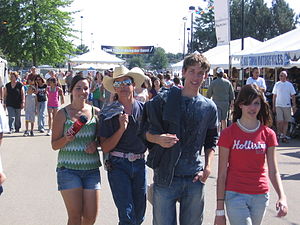You might imagine that writing for teenagers is much like writing for adults. In the fiction genre, you’d be right. Teens can handle almost as much as adults, but remember these kids are between about 16 and 21. They have the appropriate vocabulary in most instances, and can handle tougher topics with more intense moments. Just remember these books end up in a school library somewhere, so you still shouldn’t be too graphic in sexual descriptions or in violent action if you want them to appear.
But no topic is too much for kids this age. They’re probably already having sex themselves, and have been exposed to drugs and probably some violence in their lives in one way or another. It’s not as damaging to them as it might be to a middle-grader, for example.
- Image via Wikipedia
Nonfiction is a totally different animal. When writing for teens, think upper high and college. Teachers expect you to stretch the vocabulary and to write with a higher, more academic style — in general. Writing for teen magazines would be the exception because the language should be much the same as it would be fore adults. However, when writing books intended to teach teens something, you need to be more formal. Think college text book, but interesting.
My last four biographies were in this genre and let me tell you… for someone geared toward writing as she thinks, the first book was a real challenge. You do get the hang of it, though, and then, the style becomes easier to achieve.
Teens this age think of themselves as adults, but whether or not they are mature enough to be considered adults is questionable. Remember, their brains are still blue. By that, I mean, they’re still developing mentally, and some develop more quickly than others.
But the worse possible thing you can do is talk “down” to them. Find out who they are and meet on their level. If you can volunteer at a high school or college, that would be a great place to get to know kids this age, and as with any age, knowing this group is very important if you want to write for them.
They want to fall in love at this juncture in their lives. They want to test limits and break barriers that were before too stringent for them. Some of them are experiencing their first time away from home. And though they’re less “identity crisis” driven than kids in the young adult group, they still haven’t settled on whom they want to be. And still, some of them live at home and are terrified of being completely self-sufficient. It hasn’t happened quite yet, but they’re on the verge of having to get real jobs that will sustain their style of life.
As anyone who has already grown up, that’s a tough thing to do, but it’s especially tough for kids who’ve had all they wanted through life. They just expect it to continue and are more often surprised than not when mommy and daddy are no longer picking up the tab. It’s a huge change for them.
So, it’s a mix. Mature and then, not so much. You can create interesting characters from this mix, and you can write intriguing biographies of people who have solved what they need to go through. That’s part of the fun of writing for this group — the complexity of their ever-developing and questioning minds.


